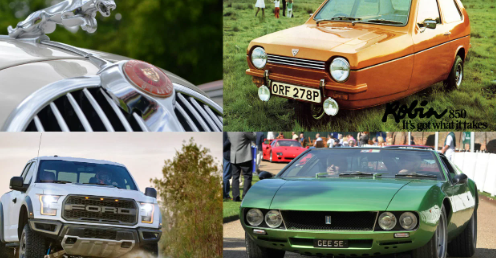In the world of automobiles, the names chosen for vehicles often reflect the essence of the car, conveying a sense of power, elegance, or uniqueness. Among these, a fascinating niche is the trend of naming cars after cats. This practice leverages the attributes commonly associated with felines—agility, speed, grace, and mystery—to create a powerful image for these vehicles. In this extensive article, we will delve into various cars named after cats, exploring their history, features, and the impact of their feline-inspired names on branding and market reception.

The Charm of Feline-Inspired Car Names
Why Automakers Choose Cat Names
Automakers often choose names that evoke specific qualities or emotions. Cats, with their sleek movements, sharp reflexes, and independent nature, are a natural inspiration for car names. These names not only attract attention but also suggest certain characteristics about the vehicle, such as speed, elegance, and a predatory edge.
Historical Context
The tradition of naming cars after cats dates back several decades. Early examples include the 1960s with cars like the Mercury Cougar, which was designed to appeal to a young, adventurous demographic. Over the years, this trend has continued, with various manufacturers opting for feline names to give their cars a distinctive edge.
Iconic Cars Named After Cats
Jaguar: The Pinnacle of Elegance and Performance
History and Legacy
Jaguar, one of the most renowned car brands, perfectly encapsulates the feline grace and power. Founded in 1922, Jaguar has consistently positioned itself as a symbol of luxury and high performance. The brand’s name was inspired by the predatory nature of the jaguar, a big cat known for its speed and agility.
Key Models
- Jaguar E-Type: Often cited as one of the most beautiful cars ever made, the E-Type combined stunning looks with remarkable performance.
- Jaguar XJ: A long-running series known for its luxury and advanced technology.
- Jaguar F-Type: A modern sports car that embodies the brand’s commitment to excellence in design and driving experience.
Mercury Cougar: A Classic American Muscle Car
The Birth of the Cougar
Introduced by Mercury, a division of Ford, in 1967, the Cougar was aimed at the burgeoning muscle car market. Its name evoked the sleek, powerful image of a cougar, a native North American predator.
Evolution and Impact
The Cougar went through several transformations, from a muscle car in its early years to a luxury coupe in the 1970s and 1980s. Despite its changes, the Cougar remained a popular choice among American car enthusiasts, known for its distinctive design and performance.
Other Notable Feline-Inspired Cars
Panther De Ville
The Panther De Ville was a luxury saloon car produced by the British manufacturer Panther Westwinds. Known for its retro styling and opulence, the De Ville was a favorite among celebrities and the wealthy.
Ford Puma
The Ford Puma, a compact sports coupe introduced in the late 1990s, was designed to offer a fun driving experience with its nimble handling and sporty aesthetics. The name Puma, another agile and powerful big cat, underscored the car’s dynamic capabilities.
Feline Traits in Automotive Design and Performance
Agility and Speed
Many cars named after cats are designed to emphasize agility and speed, much like their namesakes. For instance, the Jaguar F-Type and the Ford Puma are celebrated for their responsive handling and quick acceleration, mirroring the swift movements of a jaguar or puma.
Elegance and Style
Cars with cat names often feature sleek, stylish designs that reflect the elegance of felines. The Jaguar E-Type, with its long, flowing lines, is a prime example of how a car can embody the grace and beauty of a cat.
Power and Performance
Felines are known for their strength and predatory nature, traits that are also emphasized in the performance capabilities of these vehicles. The Mercury Cougar and Jaguar XJ, for instance, both boast powerful engines and robust builds that convey a sense of power and dominance.
Market Reception and Branding Impact
Consumer Perception
The use of cat names in car branding often has a significant impact on consumer perception. These names can evoke a sense of mystery, excitement, and luxury, appealing to a wide range of buyers. For example, the name Jaguar immediately conjures images of high performance and luxury, which can attract consumers looking for a premium vehicle.
Marketing Strategies
Automakers often leverage the feline attributes associated with their car names in their marketing strategies. Advertisements for cars like the Jaguar or the Ford Puma frequently highlight their speed, agility, and stylish design, drawing a parallel to their animal counterparts.
Brand Loyalty and Identity
Cars with distinctive names like those inspired by cats often enjoy strong brand loyalty. Owners of these vehicles may feel a unique connection to the brand due to the evocative nature of the name, contributing to a stronger brand identity and repeat customers.
Future Trends in Feline-Inspired Car Names
Emerging Models
As automakers continue to innovate, we may see more vehicles with cat-inspired names. The appeal of these names remains strong, and future models could capitalize on this trend to stand out in a competitive market.
Evolution of Design and Technology
Future cars named after cats will likely incorporate advanced technologies and design elements that further enhance their association with agility, speed, and elegance. This could include electric drivetrains, advanced aerodynamics, and cutting-edge safety features.
Notable Cars Named After Cats
| Car Model | Manufacturer | Year Introduced | Key Features |
|---|---|---|---|
| Jaguar E-Type | Jaguar | 1961 | Iconic design, high performance, luxury |
| Mercury Cougar | Mercury (Ford) | 1967 | Muscle car, sleek design, powerful engines |
| Panther De Ville | Panther Westwinds | 1974 | Luxury saloon, retro styling, opulent interiors |
| Ford Puma | Ford | 1997 | Compact sports coupe, nimble handling, stylish |
| Jaguar F-Type | Jaguar | 2013 | Modern sports car, advanced technology, elegance |
Conclusion
Cars named after cats have carved out a unique niche in the automotive world, combining the attributes of their feline namesakes with innovative design and performance. From the luxurious Jaguar to the iconic Mercury Cougar, these vehicles continue to captivate enthusiasts and consumers alike with their blend of style, power, and agility.
FAQs
Why do car manufacturers name cars after cats?
Car manufacturers name cars after cats to evoke attributes such as speed, agility, elegance, and power, which are commonly associated with felines.
What are some of the most famous cars named after cats?
Some of the most famous cars named after cats include the Jaguar E-Type, Mercury Cougar, Panther De Ville, and Ford Puma.
How do feline-inspired names impact car branding?
Feline-inspired names impact car branding by creating a strong, evocative image that can attract consumers and enhance the vehicle’s appeal through associations with the desirable traits of cats.
By carefully choosing feline-inspired names and aligning their marketing strategies with the attributes of these majestic animals, car manufacturers continue to create vehicles that capture the imagination and desire of car enthusiasts around the world.






